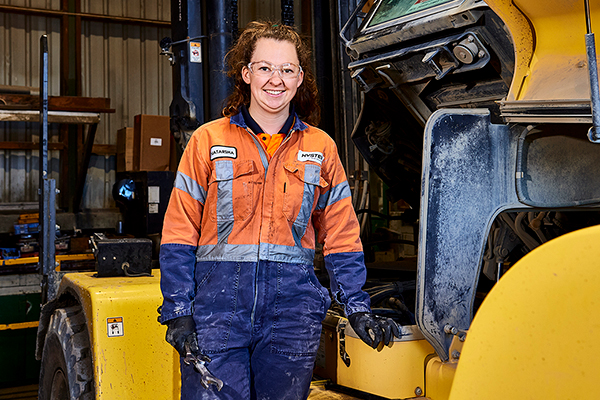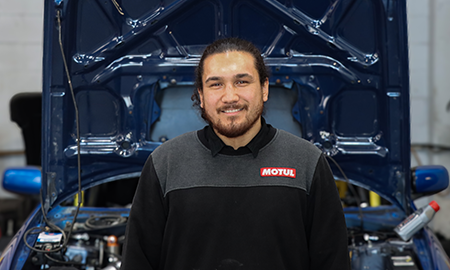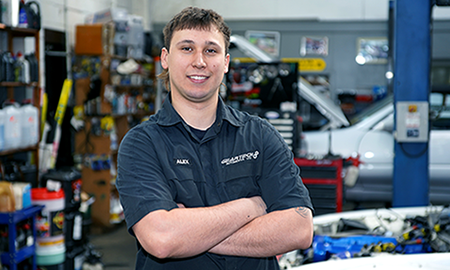FROM SHIPS TO FORKLIFTS
No two days are the same for Hyster NZ apprentice heavy diesel mechanic, Natarsha Smith. “We’ve got about twenty machines at this site with forklifts ranging from two and a half tonne right up to twenty-five tonne,” she explains. “We fix anything on the machines that can break so anything from the front mast to the hydraulics and the electrical and mechanical side. Whatever’s broken, we fix it – you never know what you’re going to get!”
With a day so varied, it’s no surprise that Natarsha’s favourite part of the job is problem-solving. “When you’re not sure what’s wrong and you figure it out, that’s the best.”
Natarsha’s been working at Hyster NZ in Mount Maunganui for two and a half years and is well on her way through her MITO New Zealand Certificate in Heavy Automotive Engineering with strand in Materials Handling Equipment (Level 3 and 4) qualification. This programme is designed for those interested in servicing and repairing electric and non-electric forklifts and other fuel or electric powered machinery used for moving and storing materials, goods and products.

Natarsha Smith is completing her New Zealand Certificate in Heavy Automotive Engineering through MITO.
This wasn’t always the intended pathway for Natarsha, originally setting her sights on a career on ships. “I got my ticket to be officer in charge of cruise and cargo ships and decided that I enjoyed the job but didn’t want to work overseas,” she says. “I then got my skippers ticket which included engineering training and I found it really interesting, so I decided to look for an apprenticeship in that.”
“There was a job in Tauranga for materials handling and I thought that sounded pretty cool, so I applied and here I am! I’m really grateful it worked out the way it did. It feels like one of those things in life that’s meant to happen.”
Hyster Bay of Plenty’s Service Manager Etienne Stephens could not sing her praises more, saying, “Natarsha’s set the tone for the calibre of apprentices that we hope to take on in the future and that the programme delivers as well. It’s awesome to be a part of her journey.”
“It’s good to be able to bring apprentices into your own mould and grow them according to the company requirements and set that foundation from the start,” he adds. “With an apprentice, we’ll look at someone who is able to prioritise both their theory and practical work well. Natarsha’s been ahead of her course work from day one and whatever challenge is ahead of her in her work, she just gets it done.”
Natarsha talks about the need for more technicians in the heavy diesel industry and the materials handling sector in particular. “There are definitely not enough technicians. I would say that about most of the heavy diesel industry. Every business I know of is short of skilled workers and apprentices.”
Etienne agrees with Natarsha, saying, “all businesses should be taking on apprentices when they can.”
Natarsha also mentions that despite the traditional expectation that the heavy diesel industry is just for males, this is simply not true. “I’m very fortunate with the timing that I got into the industry because the opinions of having females doing this kind of work is improving greatly and I get really positive feedback,” she states. “Especially in heavy diesel, people think it’s going to be hard work and a lot of heavy lifting but if something weighs too much, there’s always another machine that you can use to lift it.”
“I would definitely recommend this industry to anyone,” Natarsha concludes. “It’s a lot of fun!”



